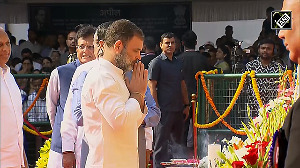Presenting the Budget for 2003-04 today, Maharashtra's Finance Minister Jayant Patil announced a cut in stamp duty by up to 2 per cent in different slabs for residential transactions and up to 3 per cent, down from the current 5 per cent, for irrigated land transactions.
For mortgaged land, the stamp duty is 1 per cent, the ceiling for which has been brought down to Rs 500,000 from Rs 10 lakh (Rs 1 million).
The budget also proposed an increase in the rate of electricity duty. For householders, it would go up from 10 per cent to 12 per cent and for commercial users, from 12 per cent to 13 per cent. "The increase will be up to five paise per unit and will not have an adverse impact on the less affluent consumers," Patil said.
The Confederation of Indian Industry welcomed the budget. It pointed out that the rate of stamp duty in Maharashtra was lower than that in other states and a further concession of up to 2 per cent would give a boost to the housing industry.
Patil announced that the value-added tax regime would come into force on April 1 in the state and would effectively replace the Bombay Sales Tax Act, The Works Contract Act, The Lease Act, Sugarcane Purchase Tax Act and Motor Spirit Tax Act.
He expressed hope that traders would pass on the benefits of the effective reduction in tax to consumers.
Patil said the government was awaiting the Centre's decision on allowing state governments to tax services, leading to increased revenue for the states.
Patil threw in several sops in the Budget. The entertainment tax on live outdoor shows will be cut to bring it in line with that in other states.
To help the state's ailing sugar industry, the sugarcane purchase tax, from which the state realises around Rs 115 crore (Rs 1.15 billion), will be waived for this year.
Patil also announced a special Rs 500 crore (Rs 5 billion) package for tribals and the backward classes. "One hundred backward class students will be selected through a competitive examination and the cost of their education in the best professional courses will be borne by the state government.
"Similarly, the 10 best students belonging to families having an annual income below Rs 250,000 , selected through a competitive examination, would be sent for higher education to the best foreign universities on state expense. An outlay of Rs 6.5 crore (65 million) has been kept for this purpose," Patil said.
A similar freeship scheme seeks to benefit 400,000 students belonging to other backward classes at a cost of Rs 120 crore (Rs 1.2 billion) annually.
Patil presented an annual Plan of Rs 12,650 crore (Rs 126.5 billion), up from the current fiscal's Rs 11,135 crore (Rs 111.35 billion), to be sent to the Planning Commission for approval. Plan and non-Plan outlays lay emphasis on social services, elementary education, primary health and housing for the poor.
Patil admitted that the revenue and fiscal deficits had deteriorated from Rs 5,224 crore (Rs 52.24 billion) and Rs 8,576 crore (Rs 85.76 billion), respectively, in 2000-2001 to Rs 8,189 crore (Rs 81.89 billion) and Rs 10, 888 crore (Rs 108.88 billion), respectively, in 2001-2002. He attributed this to a rise in expenditure and a fall in receipts.
In the current fiscal, the revenue deficit was expected to fall by Rs 569 crore (Rs 5.69 billion) to Rs 7,619 crore (Rs 76.19 billion) from last year's Rs 8,188 crore (Rs 81.88 billion), Patil said.







 © 2025
© 2025